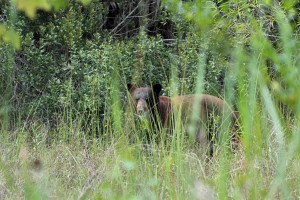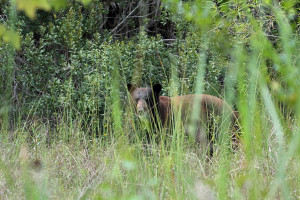 Outside of Florida, people are often surprised to hear that bears are wandering the streets in this state, but they are! This state is full of many different species. In fact, earlier this year a bear bit a man in the face in a neighborhood in Naples, Florida, which is not to far away from the Everglades. Black bears are the kind people will spot in the Everglades and south Florida. While in the Everglades, there is a chance you will catch a site of a bear; they can be spotted in forested sloughs and oak scrub.
Outside of Florida, people are often surprised to hear that bears are wandering the streets in this state, but they are! This state is full of many different species. In fact, earlier this year a bear bit a man in the face in a neighborhood in Naples, Florida, which is not to far away from the Everglades. Black bears are the kind people will spot in the Everglades and south Florida. While in the Everglades, there is a chance you will catch a site of a bear; they can be spotted in forested sloughs and oak scrub.
Florida black bears have an average 300 pounds though they can get up to 500 pounds in weight. They have long, sharp claws, which are great for climbing trees and digging for food. Florida black bears are omnivores (eat both meat and vegetation). Some of the food they feast on includes: armadillos, honey, berries, insets, acorns, sabal palm fruits, acorns, and saw palmetto.
The Florida black bear is the state’s largest land mammal. They enjoy life in the Everglades, because it’s a protected wildlife area, where they can roam freely and avoid humans. These bears prefer to live in isolated subpopulations throughout the state. They have adapted to the state’s subtropical climate and habitat, which other black bears in other parts of the country could not withstand. The Park has plenty of food sources for this bear, which makes it an ideal habitat for the bear.
Habitat loss is a serious issue for the black bear. They are losing 20 acres of their habitat per hour. Human development has separated and isolated the bear population in Florida.
In Florida, the primary cause of death for a bear is becoming roadkill. Around 100 bears die each year due to car-related accidents.
If you’re in the Everglades and come across a bear, you should back away slowly, don’t turn your back, don’t run, don’t climb a tree, make noise to scare the bear, and don’t feed the bear. Bears aren’t known to attack humans in Florida but people have been hurt when a bear feels it, its cubs, or food sources has been threatened.
Explore the Everglades on an Airboat
If you’d like a chance to see the Florida black bear and other Everglades wildlife, book an airboat tour! Everglades airboat tours give you access to the expansive wildlife and plant life the region has to offer. To book your Everglades airboat tour today, click here or call Captain Mitch’s Airboat Tours at 239-695-3377.
 Did you know Florida is home to over 2,500 bears? The Florida Black Bear, the state’s only resident bear, is Florida’s largest land-based mammal. These gentle giants, ranging from 125-450 pounds, live in seven isolated subpopulations from the Panhandle down to the Everglades.
Did you know Florida is home to over 2,500 bears? The Florida Black Bear, the state’s only resident bear, is Florida’s largest land-based mammal. These gentle giants, ranging from 125-450 pounds, live in seven isolated subpopulations from the Panhandle down to the Everglades.





